How are industrial shredders revolutionizing the construction and demolition industry by efficiently processing waste materials and reducing environmental impact?
Introduction
The construction and demolition (C&D) industry generates significant waste, including wood, concrete, metal, and plastic. Proper waste management is crucial for environmental sustainability and regulatory compliance. Industrial shredders are vital in processing this waste, turning it into valuable secondary materials.

Key Benefits of Using Industrial Shredder
Efficient Waste Reduction
Shredders can reduce the volume of waste, minimizing the need for landfill space and reducing transportation costs.
Material Recovery
Shredding materials like wood, plastic, and metal can be recycled and reused, conserving natural resources.
Enhanced Safety
Shredding large debris into smaller, manageable pieces can reduce the risk of accidents and injuries on construction sites.
Regulatory Compliance
Proper waste management and recycling practices can help businesses comply with environmental regulations.
Cost Savings
Reduced waste disposal costs and increased revenue from recycled materials can lead to significant cost savings.
Use of Shredders for Construction and Demolition Industry
Wood waste: Timber, pallets, and other wood debris can be shredded into wood chips for mulch or biomass fuel.
Concrete and masonry: Concrete and brick can be crushed into aggregates for construction projects.
Metal waste: Metal scraps can be shredded and recycled into new metal products.
Plastic waste: Plastic debris can be shredded and recycled into various plastic products.
By investing in industrial shredding solutions, C&D companies can contribute to a more sustainable future and improve their bottom line.

